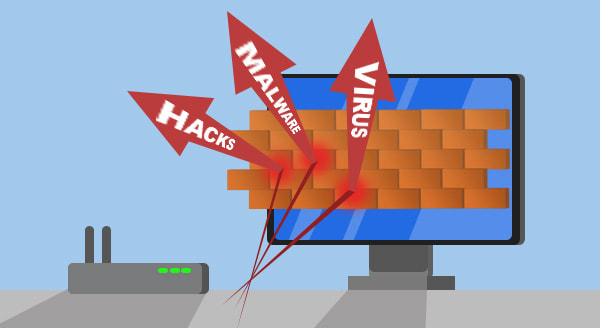|
You may not be storing military secrets or running a billion-dollar empire, but your business is still an attractive target for hackers. You need a firewall - a guard standing at the door of your network to stop the bad guys from getting in while still letting your staff come and go without interruption. A surprising number of businesses are operating without a firewall, or with one unsuitable to the requirements of a business network. For most, it’s a risk they don’t know they’re taking because they assume all systems have built-in protections. Unfortunately, by the time the lack is discovered, it’s far too late.
A firewall is actually a special type of hardware or software that acts as a protective shield between the computers on your network and assorted cyber dangers. Data is constantly passed through at lightning fast speeds, invisible to the user experience. Filtering: A strong firewall actively looks for known viruses, phishing emails and spam, and then blocks them before they can get in the door. Its internal knowledge of threats is updated regularly and search patterns quickly adjusted. Business firewalls also monitor data in both directions. When a computer goes online, all the data coming in and out is inspected to see whether it’s safe or not. If it doesn’t pass the test, the firewall instantly blocks it and records the details in a log. Performance: You can use your firewall to set network traffic priorities. For example, it can make sure a Skype call gets all the resources it needs to allow for flawless video and voice quality, while someone watching YouTube videos at the same time will receive reduced resources. Rules can be set to allow certain applications to be treated as a higher priority than others, certain departments or even users. You can tailor your network performance to meet your unique business needs. Management: Business firewalls allow you to see who’s doing what and when over your network. You can create rules for specific users, devices and times. For example, you might allow your employees to access Facebook during lunch breaks only, while at the same time keeping it completely unblocked for you or your marketing team. Thorough logs are kept automatically and can be used to troubleshoot problems. For example, your firewall logs might show that a computer inside your network connects to a third world country at 3am each night, which would certainly be worth investigating. Connection: A strong firewall allows your remote workforce to access your servers with ease and security, while at the same time keeping cyber-attacks out. Remote work arrangements are growing in popularity and necessity, often requiring server access at a moment’s notice. You can set your firewall to authenticate the identity of users before allowing access, and create a virtual private network (VPN) that keeps any transferred data safe from interception. We can install, configure and manage your business firewall - Call us at 262-515-9499 to start protecting your business today. |
Tech Force BlogWe provide you with important, practical tips and insight for your technology and networks for both home and business. Archives
March 2024
Categories
All
|
Get in touch with us! |
See what our clients have to say...
Very pleased with Tech Force! We've been using Tech Force for over four years now. We've had a lot of different people do computer and IT stuff for us, but Tech Force is the first to come in and implement a plan. The plan was executed and we've had no problems. |
More Client Reviews
Read Our Customer Reviews |
We service Racine, Mount Pleasant, Sturtevant, Wind Point, Union Grove, Elmwood Park, Franksville, Caledonia, Kenosha, Somers, Pleasant Prairie, Bristol, Parkside, Oak Creek and Franklin, WI and surrounding areas. Copyright © 2009-2024 Tech Force Computer Service, LLC.


 RSS Feed
RSS Feed
